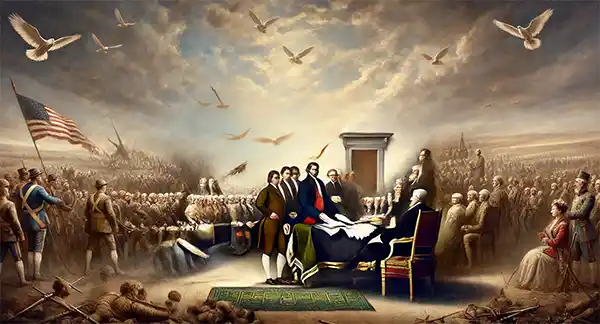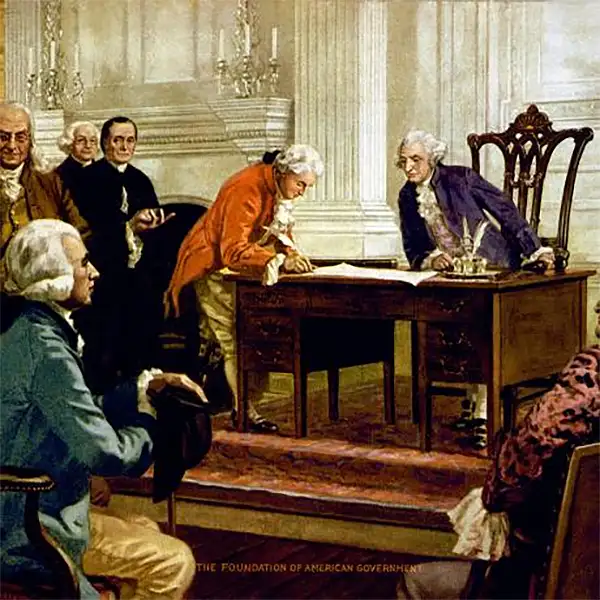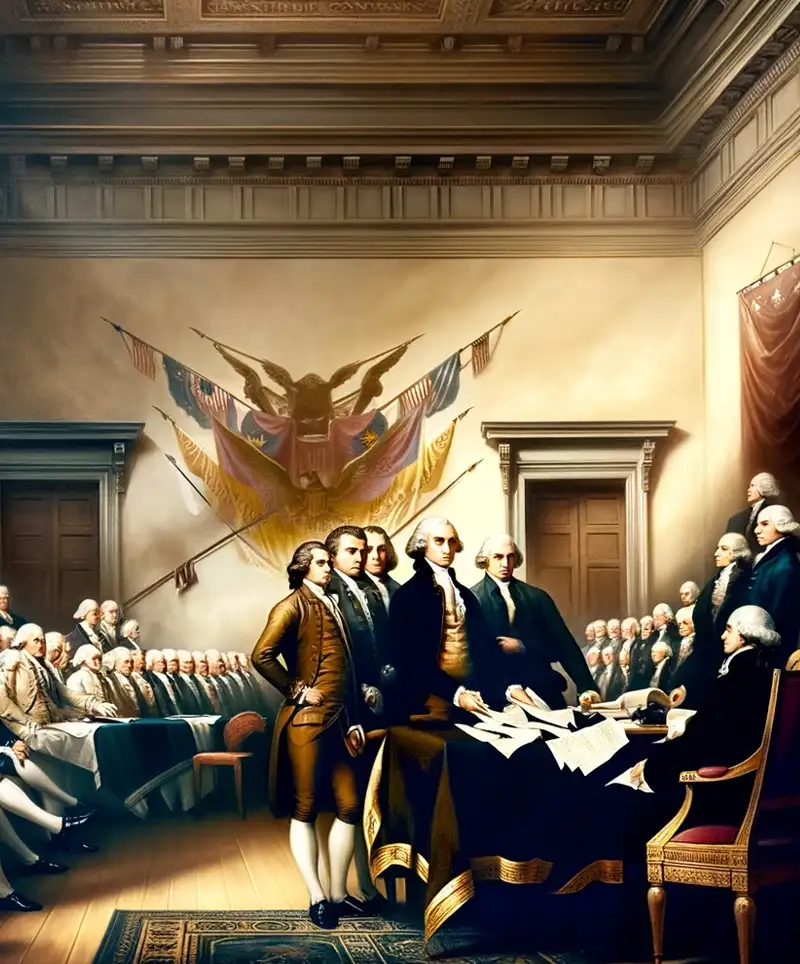Celebrating a Cornerstone of American Democracy
Ratification Day, observed every January 14th, is not just a date on the calendar; it's a celebration of a defining moment in the annals of American history. This day takes us back to January 14, 1784, when the Continental Congress ratified the Treaty of Paris, officially marking the end of the Revolutionary War and solidifying the United States' independence from Great Britain. It's a day that symbolizes the triumph of a fledgling nation over colonial rule, a testament to the resilience and unwavering spirit of the American people.
This historic day is more than just the culmination of a war; it represents the dawn of a new era. The ratification of the Treaty of Paris was a bold statement to the world about the birth of a new, sovereign nation founded on principles of liberty and democracy. It was a moment of unity and resolve, where the collective dream of freedom and self-governance transformed from a bold vision into a tangible reality.
Ratification Day thus serves as a beacon, illuminating the journey of a group of colonies that dared to challenge the might of the British Empire and emerged victorious. It's a day that invites reflection on the courage, sacrifice, and vision of the founding fathers and all those who fought for the idea of a free and independent nation. The events of this day set in motion the creation of the United States Constitution and the establishment of a government by the people, for the people.
 In commemorating Ratification Day, we remember not just a historical treaty but the enduring values that it represents. It's a day that underscores the importance of unity, the power of collective action, and the enduring impact of standing up for one's beliefs. As we observe this day, we are reminded of the continuous effort required to uphold the freedoms and rights established over two centuries ago, and the ongoing journey of the United States as a beacon of democracy and liberty.
In commemorating Ratification Day, we remember not just a historical treaty but the enduring values that it represents. It's a day that underscores the importance of unity, the power of collective action, and the enduring impact of standing up for one's beliefs. As we observe this day, we are reminded of the continuous effort required to uphold the freedoms and rights established over two centuries ago, and the ongoing journey of the United States as a beacon of democracy and liberty.
The Treaty of Paris
The Treaty of Paris, signed on September 3, 1783, and ratified on January 14, 1784, is not merely a historical document but a cornerstone in the annals of world politics and American history. This treaty, which officially ended the American Revolutionary War, was much more than a diplomatic agreement; it was a symbol of a dramatic shift in global power dynamics and the emergence of a new, independent nation on the world stage.
The negotiation of the Treaty of Paris was a complex and delicate endeavor involving representatives from the United States and Great Britain. The American delegation included prominent figures like Benjamin Franklin, John Adams, and John Jay. These negotiators were tasked with not only securing recognition of American independence but also with determining the boundaries of the newly established nation. The resulting agreement extended the United States' territorial claims from the Atlantic coast to the Mississippi River, significantly expanding the new nation's size and potential.
The Treaty of Paris had implications that went far beyond American shores. It signaled a change in the concept of colonialism and empire. The successful bid for independence by the American colonies inspired other colonial territories worldwide, setting a precedent for self-determination and national sovereignty. This treaty marked the beginning of the end for the age-old system of colonial empires, paving the way for the birth of modern nation-states.
For the United States, the Treaty of Paris was more than a diplomatic victory; it was a beacon of hope and a testament to the power of ideals. It represented the successful culmination of the struggle for liberty, the rule of law, and self-governance. This landmark document laid the foundation for the future of the United States, not only in terms of its geographic boundaries but also in its political and philosophical outlook.
 The ratification of the Treaty of Paris is commemorated on Ratification Day, reminding us of a time when a young nation, through sheer determination and vision, carved out its place in the world. The treaty's legacy lives on, symbolizing the enduring values of freedom and democracy. It serves as a reminder of the sacrifices made for independence and the continuous need to protect and nurture the principles upon which the United States was founded.
The ratification of the Treaty of Paris is commemorated on Ratification Day, reminding us of a time when a young nation, through sheer determination and vision, carved out its place in the world. The treaty's legacy lives on, symbolizing the enduring values of freedom and democracy. It serves as a reminder of the sacrifices made for independence and the continuous need to protect and nurture the principles upon which the United States was founded.
A Reflection of Unity and Resolve
Ratification Day, marked each year on January 14th, is more than a historical commemoration; it's a reflection of the unity and resolve that forged the United States of America. The ratification of the Treaty of Paris on this day in 1784 wasn't just a formal end to hostilities; it was a moment that crystallized the collective aspirations of a diverse group of colonies into a single, unified nation.
The journey to Ratification Day was fraught with challenges, disagreements, and hardships. Yet, the decision to ratify the Treaty of Paris represented a significant moment of cohesion and solidarity among the states. This unity was hard-won, born from the shared experiences of the Revolutionary War and the common goal of independence. The ratification symbolized a turning point, where the divergent interests of 13 colonies were woven into the fabric of a single, united country.
The events leading to Ratification Day showcased the remarkable resolve of the American people. Faced with a formidable enemy and immense obstacles, the colonies' decision to stand together and ratify the treaty was a bold statement of their determination to maintain their hard-earned sovereignty. This collective resolve was a critical factor in the successful negotiation of the Treaty of Paris and the establishment of the United States as an independent nation.
The ratification of the Treaty of Paris was the culmination of the American dream of self-governance and liberty. It was a dream shared by people from all walks of life – farmers, merchants, soldiers, and statesmen – who, despite their differences, found common ground in their desire for freedom and justice. Ratification Day, therefore, stands as a testament to the power of a shared vision to overcome adversity and forge a new path.
Today, Ratification Day serves as a reminder of the enduring legacy of unity and perseverance that characterizes the American spirit. It's a day to reflect on the principles that brought the nation together – principles of democracy, equality, and the rule of law. By commemorating this day, we acknowledge not just the end of a war but the beginning of a united approach to nation-building, governance, and the pursuit of a common good.
While Ratification Day might not be as widely celebrated as Independence Day, it holds its own as a day of historical significance. Various historical societies and organizations acknowledge this day with educational events, reenactments, and discussions about the Revolutionary War and its aftermath. It's an opportunity for Americans to delve deeper into their rich history, understanding the challenges and triumphs that shaped their nation.
The legacy of Ratification Day extends beyond the historical event itself. It serves as a reminder of the enduring principles of liberty and self-governance that form the foundation of the United States. This day encourages reflection on the ongoing journey of the nation, the evolution of its democracy, and the continuous effort required to preserve and protect the freedoms and rights established over two centuries ago.
Please Share our Content






 In commemorating Ratification Day, we remember not just a historical treaty but the enduring values that it represents. It's a day that underscores the importance of unity, the power of collective action, and the enduring impact of standing up for one's beliefs. As we observe this day, we are reminded of the continuous effort required to uphold the freedoms and rights established over two centuries ago, and the ongoing journey of the United States as a beacon of democracy and liberty.
In commemorating Ratification Day, we remember not just a historical treaty but the enduring values that it represents. It's a day that underscores the importance of unity, the power of collective action, and the enduring impact of standing up for one's beliefs. As we observe this day, we are reminded of the continuous effort required to uphold the freedoms and rights established over two centuries ago, and the ongoing journey of the United States as a beacon of democracy and liberty. The ratification of the Treaty of Paris is commemorated on Ratification Day, reminding us of a time when a young nation, through sheer determination and vision, carved out its place in the world. The treaty's legacy lives on, symbolizing the enduring values of freedom and democracy. It serves as a reminder of the sacrifices made for independence and the continuous need to protect and nurture the principles upon which the United States was founded.
The ratification of the Treaty of Paris is commemorated on Ratification Day, reminding us of a time when a young nation, through sheer determination and vision, carved out its place in the world. The treaty's legacy lives on, symbolizing the enduring values of freedom and democracy. It serves as a reminder of the sacrifices made for independence and the continuous need to protect and nurture the principles upon which the United States was founded.








 "Sláinte!" is a traditional Irish expression used as a toast, equivalent to "Cheers!" in English.
"Sláinte!" is a traditional Irish expression used as a toast, equivalent to "Cheers!" in English.